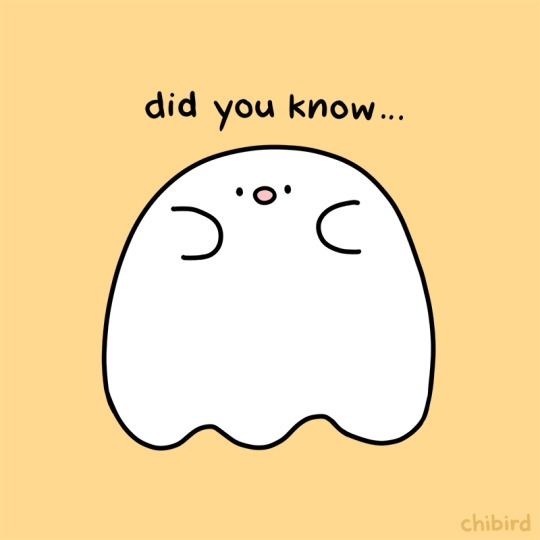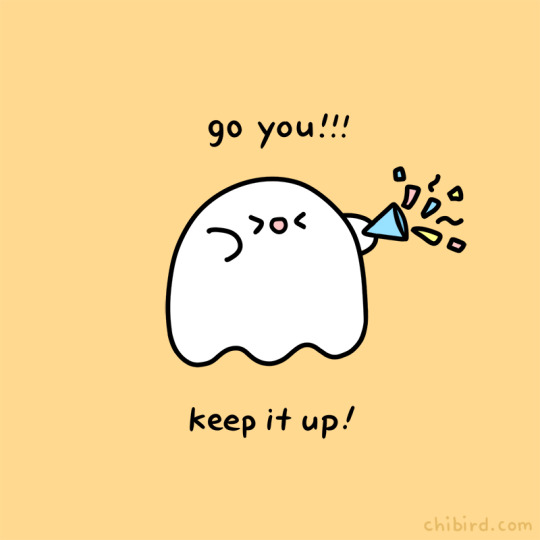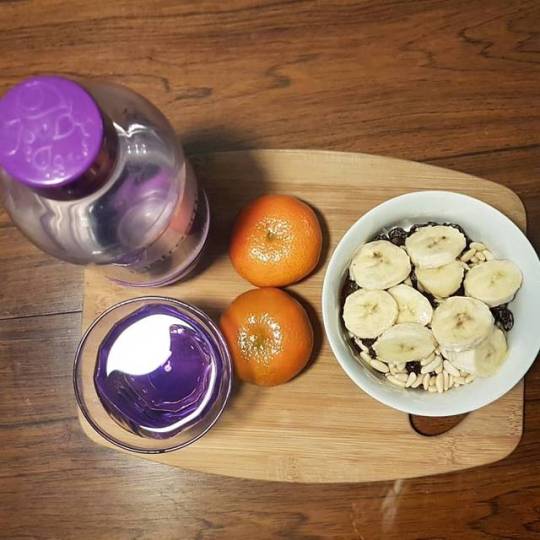Text
so I got into grad school today with my shitty 2.8 gpa and the moral of the story is reblog those good luck posts for the love of god
1M notes
·
View notes
Text
lay out intentions like paving of ease in future moments. “i’m gonna have fun in class tomorrow”, “when i go for a walk i’m gonna see so many beautiful things”, “i’m gonna have the most cozy night tonight”, “i’m gonna be very present with my friend on wednesday”, etc. see how easily the moment adapts. it’s like a little spell to set yourself up for goodness
75K notes
·
View notes
Photo




Ghostie friend is amazed at how awesome you’ve been doing! Great job! 🎉
Chibird store | Positive pin club | Webtoon
10K notes
·
View notes
Text
𝒔𝒕𝒖𝒅𝒚 𝒕𝒆𝒄𝒉𝒏𝒊𝒒𝒖𝒆𝒔
use two notebooks when taking class notes (one for in class and one for at home) the one for class, make it messy with footnotes and subtext. the one at home, make it neat (these are the ones to study off of; easy to read and short)
quizlets or kahoots
write down your plans for the week
put effort in your projects (trust me, it’s worth the time)
make school life feel cliche and try to romanticize things (it works)
when you’re studying, rewrite your notes to match your own words
relate the information to yourself and your life. if you have chalk, draw math formulas on pavement, match your physics to life situations, randomly say history facts when relevant
study in shorter intervals and take a decent amount of breaks (ie, 30 minutes spent studying with a 15 minute break; don’t go on the internet during that break)
have a routine. study for a period of time in the morning or study before bed (do this every day; even on the weekends)
stay hydrated; drink water or tea (not to much coffee)
2K notes
·
View notes
Text
How to Develop Discipline in Studying
This article is requested by @lightokunello , @dreamiingsoftly, and people who are quite sceptical about the feasibility of discipline-based studying (on contrary to motivation-based studying) as advised in my “Motivation vs. Discipline: Explained” here.
As I said before in the “Motivation vs. Discipline: Explained” post, studying based on discipline is basically studying out of habit because it basically means “studying without thinking of a future reward because your brain and body already think it is the normal thing to do.” Hence, to develop discipline in studying, you should make studying as your new habit. But, how can we make something as tedious as studying as a habit?
You can read many articles on how to develop a new habits and you can judge for yourself which one sounds most practical among the others, but first thing first, let me share my tips.
1. Make a commitment with yourself that you will make studying as your habit.
This is super important. Commit yourself to make this as your new habit. Don’t half-ass any of these suggestions or any other suggestions that other people give. Don’t give yourself silly, illegitimate excuses in the process. For this, you can do it by remind yourself on what your long-term goals in life are. Or if they don’t sound rewarding enough, remind yourself what failure feels like/ could feel like.
2. Keep a daily to-do list; break down the things that you must do into smaller, concrete activities and put those smaller activities in that to-do list; allocate specific time periods to do each smaller activities and put it the to-do list as well; set an alarm reminder for each smaller activities.
Say you have to study for Physics on Tuesday, because for whatever reasons you just decided to dedicate your time this Tuesday to study Physics. Bravo. However, I’d suggest that you break down that specific activity (or “daily goal”) before putting it in your to-do list. So, instead of just putting “study for Physics”, try putting “read and highlight Chapter 9″, “do Exercise I.II in Chapter 9″, “sum up the points in Chapter 9″; because putting very general/broad activity like “study for Physics” can actually make you too confused on where and how to start doing it, and make you very prone to distractions in the process.
Don’t forget to allocate specific time periods to them as well, such as 20.00-21.00 for reading and highlighting chapter 9; 21.15-22.00 for doing Exercise I.II; etc. To ensure that you do it, don’t forget to set an alarm for EACH activity (it can be on your phone, laptop, alarm clock, tablet, watch, whatever).
3. Aside of the daily to-do list, keep a weekly schedule; make your study schedule as consistent as possible every week.
It is easier to keep a habit if they are done consistently the same way and in the same time, just like how it is easier to maintain a skincare routine if you consistently do it everyday in the same time period (”peeling every Wednesday and Sunday afternoon”, “eggwhite mask every Saturday morning”, “cleanse using micellar water everyday at night”). It’s the same for studying; it is easier to make it a habit if it is consistently do it in the same time every week. Which is why I suggest you to dedicate the same day every week to study/do assignment for the same school course/subject. For example: only study for Physics and Math on Tuesdays – Physics at 16.00-18.00 and Math at 19.00-21.00; only study for Biology and Chemistry on Wednesdays – Biology at 16.00-18.00 and Chemistry at 19.00-21.00 — and keep it like that every week, every month.
4. Keep distractions at (very) minimum while doing each activity.
Try to focus on what you do and not think on anything else.
5. Track your progress – don’t forget to put a checklist on your to-do list after accomplishing a task.
It would relieve your stress a bit and motivate you to continue doing the remaining activities on your to-do list. ;D
6. If you can, put as few (smaller, concrete) activities in your daily to-do lists.
When it comes to studying, it’s still better to only study 2 hours every week for every subject consistently– I’d suggest to dedicate more hours though – than study for 8 hours for every subject only when it’s already one week before the mid-term/final exam week.
The reason why I suggest this is that putting too many activities to accomplish on your daily to-do list can discourage you from starting to accomplish them (”the ‘ah f*ck it’ syndrome” is real especially among procrastinators). Putting few, however, can psychologically trick yourself to think ‘yay I only have to do these several activities’ and do it.
7. Do this for at least a semester, and find yourself taking your Physics (or any other subject) coursebook and start highlighting the important points on a Tuesday out of habit, without thinking of any motivation beforehand ;D
If you need more than semester, that’s alright, everybody adapts to new changes and adopt new habits in different pace; as long as you keep true to your commitment and still accomplish the activities that you need to do, you’re doing it right! Believe me that one day it’ll be your habit. :)
2K notes
·
View notes
Photo
Repost!!!!!

A friend once asked me how I manage to do my tasks so efficiently. I wrote a 500-word essay in 20 minutes. I finished my math homework and studied for a quiz in the half hour before morning assembly. I sleep at 9 pm on most nights. But how can I possibly achieve that?

I’ve seen people, even good students, check their phone every minute or two as they’re studying. I’ve seen students “study” for six hours straight, meaning taking down some notes then watching a YouTube video then reading their textbook then opening Instagram… you know what I mean.
My advice is to commit to whatever you’re doing. Not too long ago, another friend asked me, “Jo, do you ever get distracted at home?” to which I replied, “Distracted by what?” They told me about how they always have the urge to check their phones, talk to their friends, or get some food. I can’t say I never get distracted, but it very rarely happens to me because I focus on what I’m doing–and only what I’m doing. Here’s how:
1. During the time I allocate for working, I turn my phone to airplane mode (with WiFi switched off, of course). No messages or notifications will distract me from what I’m currently doing. Recently, though, I’ve left my phone on in case there’s anything important. There might an RMUN photoshoot tomorrow, or a Physics quiz, or a music showcase. I know myself well enough to know that I have the discipline to do nothing more than glance at the notification. However, if this isn’t true for you, then I suggest you keep your phone on airplane mode.
2. When I allocate time for relaxing, that’s all I do. No homework. No textbooks. No opening emails as they come. Just me and a good book or Photoshop or the piano or something. That way, I can satiate my thirst to relax within the half hour or so and not crave more when I start working
As for music, it’s been proven that music makes you less productive when trying to recall and absorb information (studying, in other words). Music only makes you happier when you’re doing things but not more productive.

By this, I don’t only mean which ones are most urgent, but which ones you can’t accomplish anywhere other than at home. For example, let’s say you have these three tasks: a) research about structural unemployment; b) write a poem with the theme of death; c) answer some questions about quantum physics; d) do a problem set about implicit functions; and e) memorize a set of chemical reactions. This is how I would do them:
Write the poem on the way to school. Maybe this is just because I like poetry. And because I can’t write when other people are around. I’d probably get a first draft done by the time I get home.
Do the research about structural unemployment. My school’s WiFi is terrible.
Answer the quantum physics questions. The new information is still fresh in my brain and doing the homework will help me revise, easing the process of spaced repetition.
Memorize the chemical reactions before I go to bed. Studying before you sleep is supposed to improve your memory, and since my memory is terrible, that’s exactly what I’ll do.
Do the implicit functions problem set as soon as I get to school the next morning. Math is undoubtedly my best subject, and it’s very refreshing to do math at 6:45 AM in the morning.
If you saw the pattern, I assigned each task a time slot when I would be most productive. I also did them from easiest to most difficult to the easiest again. Because everyone works differently, I suggest you find out which types of tasks are the most difficult (memorizing, in my case) and which types of tasks require a certain environment (e.g. requiring WiFi for doing research).

I guess that’s pretty much self-explanatory. I like to nap right after I get home from school if I’m feeling especially tired. As for breaks, I prefer to take them between tasks instead of every 25 minutes because of my high study inertia.

Commit to what you’re doing
Delegate and prioritize
Give yourself shorter deadlines
Take breaks!
And that’s it! Hope this guide to efficiency was helpful in some way. I do believe that by following these four steps, you can accomplish all your tasks in a much shorter amount of time. If you have any further questions, please don’t hesitate to drop me an ask!
17K notes
·
View notes
Text
Omg yes !
weird study tip:
if u don’t feel motivated, pretend ur in a movie or tv show. you know the scenes where they’re on their bed with their feet tucked up and crossed at the ankle, and they’re cracking open highlighters with their teeth and poring over a textbook with smooth rock music playing? that. bonus points for a perfect messy bun and spencer hastings outfit.
21K notes
·
View notes
Text
Rebloging this because this is what i need to do this summer and i might add a little exercise and post a on my social medias because i sort of forgot about them 😅
how I keep myself sane during summer break.
I think we can all agree that the mere idea of having holiday breaks from boring lectures and all-nighter study sessions sounds like heaven; although this romanticized idea of having so much free time often turns into wasted summer days, oversleeping, and basically an anti-social teenage version of house arrest. so, to help you out (or, more to help Myself) here are some things I do to keep myself busy, on a budget (kind of), and mentally healthy during long breaks from school.
continue your morning routine. this is important; by this I mean to basically treat your summer mornings as you would your school mornings, without the rush and alarm. brush your teeth, brush your hair, start/continue a skincare routine, get out of your pajamas and into real clothes, make your bed, make some coffee, eat some breakfast, do it with some music on, whatever you want. this keeps your mind and body into a daily routine. don’t let all your precious no-class mornings of summer go to waste!
savor sleeping in, but not too much. I know its super tempting to go to bed at like 2 AM and wake up the next “morning” at 12PM, but trust me, you’ll regret fucking up your sleep schedule once you actually have to set an alarm and get your ass to class next fall. I’m not saying you should force yourself to set a summer alarm (although, if you really want to train yourself this isn’t a bad idea tbh) but for the love of god, at least go to sleep and wake up at reasonable times. don’t waste your entire day!!
force yourself to see your friends a couple times a week, even if you really don’t want to. obviously this excludes mental health days, but I’ve found that spending time with my friends actually distracts me from any anxiety I’ve felt during the past week. I love my alone time, but human interaction is super important both mentally and physically. as college students we’re all pretty much broke, so don’t underestimate the power of free things- watching netflix at someone’s house, having a boardgame night, going to parks, you name it. as long as you’re with your friends, you’ll have a great time!
clean out your music library + make a playlist or two. y’all know I love a good playlist. this is something totally 100% FREE, and a perfect way to make use of your free time. delete all the stuff you don’t listen to anymore and make a few playlists of your favorite songs, or even go with playlist themes to organize your songs. it’s fun and your future self will probably thank you later for getting rid of so much audible junk.
get back into reading. this is something that was on my personal summer to-do list. I haven’t read a book for myself (aka not for a class) in sooo long, and let me tell you- I don’t know why I ever stopped reading. I know for a fact that once the semester starts I’ll have zero free time to read for myself, so summer is the perfect time to get into a new book or two!
eat your three meals a day +hydrate. I mean this. its very easy to skip/forget meals when you really don’t have any set schedule whatsoever, so plan your meals into your day. even make an alarm if its necessary. also: if you don’t know if you’re drinking enough water, you probably aren’t.
deep clean your room/workspace/closet. I’m super guilty for putting this off but, long breaks like summer are the perfect times to deep clean! what makes it easier for me to clean my room is to go section by section, which means not doing it all in a day (because that gets hella overwhelming and stressful, let me tell you). grab a garbage bag, put on some tunes, and pick a section to clean that day; you’ll be done with the entire space in no time!
outfit plan. for someone like me who has way too much in my closet and somehow still “never has anything to wear”, this is essential! set some outfits out on the floor/bed and take pics of them on your phone so that you can look back on them for some style inspo the next time you have “absolutely NOTHING to wear”.
find a new hobby, even if you’re bad at it. make some collages of your friends, make a scrapbook, learn photoshop, paint a little, learn how to sew, garden, cook, practice your phone photography skills… if there was a time for you to try out new things, it’s NOW.
make a post about all the shit you should do. I’m doing it right now. literally. you’re reading it right now. its not a bad idea.
if you know you have shit to do, plan it into your day! this is where the planner/agenda/bullet journal aspect comes in. having no class and no homework is not an excuse to stop planning out your day, your week, or your month. make some task lists and pencil in your dentist appointments and dates with people and whatnot; and even journal your days while you’re at it! if you’re a planner, never stop. Future You will thank you for it, I promise.
18K notes
·
View notes
Text
today my anthro professor said something kindof really beautiful:
“you all have a little bit of ‘I want to save the world’ in you, that’s why you’re here, in college. I want you to know that it’s okay if you only save one person, and it’s okay if that person is you”
1M notes
·
View notes
Text
Me every day
Hi brain, you obstinate fucker. I drank the clear splashy stuff. I ate the green things. I went under that bright fucker up there. I did the thing with the moving and sweating and whatnot. Now make the happy chemical, you lump of fuck.
417K notes
·
View notes
Photo

I need to get all of that stuff done … But i don’t really know how 😅
#studybreak#studygram#worldhistory#hydtation#history#study#todolist#todo#studyinspo#book#getshitdone#tee#studymode#textbook#pens#productivity#stickynotes#studymood#studymotivation#studyinghistory#highligthers#studyspace#studying
0 notes
Photo

I finally got my study space setup and functioning 🎉👐🏻🖤
[13/100days of productivity 29/1/18]
#100dop#studyspacegoals#motivation#studymode#oraganize#productivity#ikea#studygram#magnetboard#studyinspiration#100daysofproductivity#lifeofastudent#loveit#studyarea#organization#studyinspo#studyspaces#studying#studymotivation#study#studymood
1 note
·
View note
Photo

{10/100 days of productivity 26.01} Preparing for a big study session 😄🤙🏻 Next week is going to be so stressful i've got so many deadlines and my teachers told me just yesterday but after the 01.02.2018 i can finally relax🎉🌞
#100daysofproductivity#studygram#studyspo#studyinspiration#studymusic#studysnacks#studying#100dop#studymood#study#studymode#studyinspo#studysession#studymotivation
1 note
·
View note
Photo

#study#studyblr#studyspiration#study motivation#studyspo#student#students#studying#study notes#study mode#study inspo#study space
12K notes
·
View notes
Photo

6/100
if you’re self-studying two or more languages, then i highly recommend keeping a polyglot vocab journal. every time you learn a word, find it’s equivalent in your other target language(s). here i have italiano - english - gaeilge - türkçe. it’ll give you lots of ideas of what new words to learn!
#study#studyblr#studying#study motivation#study inspo#studyspiration#studyspo#student#students#study inspiration#studymotivation#100dop#100 days of productivity
193 notes
·
View notes
Photo

You know you’re a nerd when your self-care time is spent reading an essay about French linguistics in bed.
#studyspiration#studying#studyinspo#study inspiration#study inspo#study motivation#studymotivation#100dop#100 days of productivity#student#students#study#studyblr#school
97 notes
·
View notes
